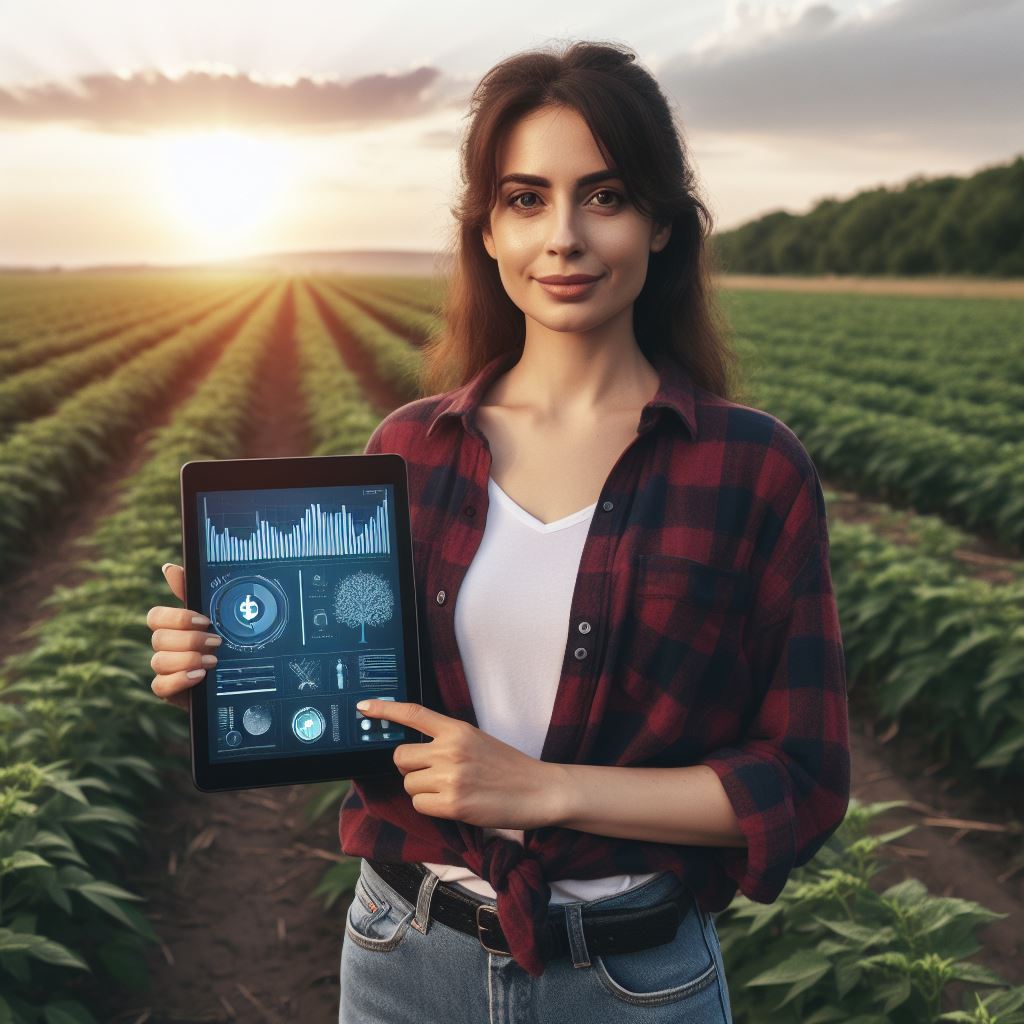Introduction
Agri-Tech refers to the application of technology in the agricultural sector to enhance productivity and efficiency.
Importance of global market trends in Agri-Tech
Global market trends in Agri-Tech are crucial as they drive the adoption of innovative solutions in agriculture worldwide.
Agri-Tech has revolutionized the agricultural industry by incorporating advanced technologies like AI, robotics, and precision farming.
These technologies enable farmers to optimize crop yield, reduce resource consumption, and improve overall sustainability.
Global market trends in Agri-Tech provide valuable insights into the latest advancements and practices in the field.
These trends help farmers and agribusinesses stay competitive and make informed decisions about adopting new technologies.
Moreover, Agri-Tech market trends outline emerging challenges and opportunities, guiding investment decisions in the sector.
For instance, the growing focus on sustainable farming practices and organic food production has spurred the development of Agri-Tech solutions.
Market trends also highlight the increasing demand for smart farming systems, which integrate data analytics and IoT to enhance agricultural operations.
Furthermore, global market trends promote international collaboration and knowledge sharing among farmers, researchers, and technology providers.
With the rapid population growth and rising demand for food, Agri-Tech market trends play a crucial role in ensuring food security and sustainability.
In general, global market trends in Agri-Tech are essential for driving innovation, sustainability, and productivity in the agricultural industry.
Overview of the current global Agri-Tech market
Market size and growth
The global Agri-Tech market is currently valued at over $XX billion, with a projected annual growth rate of XX%.
The market is fueled by the increasing demand for sustainable agricultural solutions and improved productivity.
Technological advancements such as AI, IoT, and data analytics have revolutionized the industry.
Transform Your Agribusiness
Unlock your farm's potential with expert advice tailored to your needs. Get actionable steps that drive real results.
Get StartedKey players and their contributions
Several prominent companies dominate the Agri-Tech market, including XYZ Corporation, ABC Innovations, and PQR Solutions.
XYZ Corporation specializes in precision farming technologies, helping farmers optimize resource allocation and reduce waste.
ABC Innovations focuses on developing innovative crop monitoring and management systems, enhancing crop health and yield.
PQR Solutions offers advanced agricultural data analysis tools, assisting farmers in making informed decisions for better outcomes.
Regional variations in adoption
The adoption of Agri-Tech solutions varies across regions due to factors like technological infrastructure, economic conditions, and cultural preferences.
In developed regions like North America and Europe, Agri-Tech adoption is more prevalent, driven by advanced farming practices and extensive research and development.
In emerging economies of Asia and Africa, Agri-Tech is gaining momentum as a solution to address food security and promote sustainable agriculture.
However, challenges such as lack of awareness, limited access to technology, and affordability hinder widespread adoption in certain regions.
In review, the global Agri-Tech market is experiencing significant growth, driven by the demand for sustainable agriculture and technological advancements.
Key players in the market, including XYZ Corporation, ABC Innovations, and PQR Solutions, contribute to the industry’s development through their innovative solutions.
Regional variations in Agri-Tech adoption exist, influenced by factors like infrastructure, economy, and culture.
Despite challenges, the future of Agri-Tech looks promising, with the potential to revolutionize farming practices and address global food security concerns.
Read: Farming in the Digital Age
Emerging technologies shaping the global Agri-Tech market
Precision agriculture and its impact
Precision agriculture is revolutionizing the way farmers manage their crops and maximize yields.
Through the use of advanced sensors and GPS technology, farmers can gather accurate data about soil conditions, weather patterns, and crop growth.
This data is then used to make informed decisions about when and where to plant, irrigate, fertilize, and harvest.
The result is increased efficiency, reduced labor costs, and improved crop quality.
Precision agriculture also helps farmers reduce their environmental impact by minimizing the use of water, fertilizers, and pesticides.
Internet of Things (IoT) in agriculture
The Internet of Things (IoT) is connecting devices and equipment in agriculture to collect and share data in real-time.
Sensors placed on machinery, irrigation systems, and livestock monitor various parameters such as temperature, moisture levels, and animal health.
This data can be analyzed to optimize operations, detect potential issues, and automate tasks, leading to increased productivity and profitability.
IoT also enables remote monitoring and control, allowing farmers to manage their farms from anywhere using smartphones or computers.
Furthermore, IoT improves traceability in the supply chain, ensuring food safety and quality standards are met.
Artificial intelligence and machine learning applications
Artificial intelligence (AI) and machine learning (ML) are transforming the agricultural sector.
Showcase Your Farming Business
Publish your professional farming services profile on our blog for a one-time fee of $200 and reach a dedicated audience of farmers and agribusiness owners.
Publish Your ProfileWith AI and ML algorithms, computers can analyze vast amounts of data to detect patterns, make predictions, and provide actionable insights.
For example, AI-powered systems can assess crop diseases, identify optimal planting patterns, and predict market demand.
These technologies enable farmers to optimize resource allocation, minimize waste, and increase profitability.
Robotics and automation in farming
Robotics and automation play a crucial role in reducing labor-intensive tasks and increasing productivity.
Robots can perform various agricultural activities, such as planting seeds, harvesting crops, and monitoring livestock.
This not only improves efficiency but also reduces the need for manual labor and the associated costs.
Automation also enhances precision and consistency in tasks, leading to improved crop quality and yield.
Additionally, robots can conduct repetitive tasks without getting tired or making errors, resulting in higher productivity and reduced waste.
Biotechnology advancements in agriculture
Biotechnology is driving significant advancements in agriculture, enabling the development of improved crops and sustainable farming practices.
Genetically modified organisms (GMOs) are being developed to increase crop resilience, nutritional value, and resistance to pests and diseases.
Biotechnology also plays a vital role in developing drought-tolerant crops and enhancing nutrient utilization.
Furthermore, biotechnology enables the production of biofuels from agricultural waste, reducing dependence on fossil fuels.
These advancements in biotechnology contribute to enhancing food security, reducing environmental impact, and promoting sustainable agriculture.
Basically, emerging technologies such as precision agriculture, IoT, AI and ML, robotics and automation, and biotechnology are reshaping the global Agri-Tech market.
These technologies offer tremendous opportunities for increasing productivity, sustainability, and profitability in the agricultural sector.
By harnessing the power of these technologies, farmers can optimize resource allocation, reduce environmental impact, and meet the growing demand for food in a rapidly changing world.
Read: Maximizing Profits in Farming Ventures
Factors driving the growth of Agri-Tech
Agri-Tech is experiencing a rapid growth worldwide due to various factors that are driving its expansion.
These factors are essential in addressing the challenges faced by the agriculture industry and meeting the increasing global food demand.
Here are the key factors contributing to the growth of Agri-Tech:
Increasing global population and food demand
The world’s population is continually growing, and with it, the demand for food is increasing exponentially.
Agri-Tech is a response to this challenge, providing innovative solutions to produce more food efficiently.
By utilizing technological advancements, Agri-Tech enables farmers to increase their productivity, ensuring a steady supply of food to meet the growing demand globally.
Environmental sustainability needs
Sustainable farming practices are crucial in preserving our environment and reducing the ecological footprint of agriculture.
Agri-Tech focuses on developing technologies that mitigate the negative impacts of traditional farming methods, such as excessive use of water and chemicals.
By implementing precision agriculture techniques, farmers can optimize resource usage and minimize environmental damage.
Need for optimizing yields and resource efficiency
Agri-Tech is driven by the desire to optimize yields while ensuring efficient use of resources.
Through the use of advanced technologies, farmers can monitor crop health, detect diseases, and manage irrigation and fertilization more effectively.
This results in increased yields and improved resource efficiency, benefiting both the farmers and the environment.
Government support and policies
Governments worldwide are recognizing the significance of Agri-Tech in addressing food security and environmental concerns.
As a result, they are implementing supportive policies and providing financial assistance to promote the adoption of Agri-Tech solutions.
This support encourages innovation and enables the Agri-Tech industry to grow and flourish.
Investment and funding landscape
The availability of investment and funding opportunities has played a crucial role in the growth of Agri-Tech.
Investors and venture capitalists are increasingly recognizing the potential of Agri-Tech startups and are willing to provide the necessary capital.
This influx of funding allows Agri-Tech companies to develop and commercialize their products and services, driving further innovation in the industry.
Generally, Agri-Tech’s growth can be attributed to several key factors.
The increasing global population and food demand, environmental sustainability needs, the need for optimizing yields and resource efficiency, government support and policies, and the availability of investment and funding opportunities have all contributed to the expansion of Agri-Tech.
As the agriculture industry faces numerous challenges, Agri-Tech provides innovative solutions that empower farmers to meet the growing demand for food while ensuring sustainability and resource efficiency.
Read: Navigating Finance in Agribusiness

Challenges and barriers in global Agri-Tech adoption
Agri-tech, the amalgamation of agriculture and technology, is revolutionizing the global farming landscape.
However, its widespread adoption faces significant challenges that hinder its seamless integration.
In this section, we delve into the hurdles and barriers impeding the global embrace of agri-tech.
Cost of Technology Implementation
Implementing cutting-edge agri-tech solutions comes at a hefty price.
High upfront costs for advanced machinery, sensors, and precision equipment act as a deterrent for many farmers worldwide.
The financial burden of adopting new technologies can strain the budgets of both small and large-scale agricultural operations.
Limited Access to Advanced Technology in Developing Regions
While developed nations enjoy easy access to state-of-the-art agri-tech, the same cannot be said for developing regions.
Unequal distribution of resources results in a technological divide, with farmers in less affluent areas struggling to access and implement advanced agricultural technologies.
This digital gap exacerbates existing disparities in global agricultural productivity.
Security and Cybersecurity Concerns
The integration of technology into agriculture brings forth concerns about data security and cybersecurity.
Farmers worry about the potential compromise of sensitive information related to crop yields, weather patterns, and financial transactions.
Safeguarding digital assets becomes paramount to ensure the integrity of agri-tech systems.
Resistance to Traditional Farming Practices
Lack of Awareness and Education
Traditional farming practices rooted in generations of experience often resist the adoption of agri-tech.
A lack of awareness and education regarding the benefits and functionalities of modern agricultural technologies hinders their acceptance.
Bridging this knowledge gap is crucial for fostering a positive attitude toward agri-tech.
Fear of Job Displacement
The fear of job displacement looms large in the minds of traditional farmers.
As automation and artificial intelligence become integral to agri-tech, there is a legitimate concern about the impact on manual labor in agriculture.
Addressing these fears involves emphasizing the potential for new, tech-related job opportunities.
Overcoming these challenges requires a collaborative effort from governments, technology developers, and the farming community.
Financial incentives, educational programs, and policy frameworks must be established to make agri-tech accessible to all.
Bridging the technological gap between developed and developing regions is crucial for ensuring global food security.
In a nutshell, while agri-tech holds immense promise for transforming global agriculture, challenges in the form of implementation costs, limited access, security concerns, and resistance from traditional practices persist.
Tackling these obstacles head-on is essential to unlock the full potential of agri-tech and usher in a new era of sustainable and efficient farming practices on a global scale.
Read: Effective Marketing for Modern Farmers
Promising global market trends in Agri-Tech
Vertical farming and urban agriculture
Vertical farming and urban agriculture have gained significant attention in the global agri-tech market.
With limited land availability in urban areas, vertical farming offers a solution by using stacking systems to cultivate crops in vertical structures.
This method uses less water and saves space, making it highly efficient and sustainable.
Indoor farming and controlled environments
Indoor farming and controlled environments provide an ideal solution for year-round crop production, independent of external climate conditions.
By creating a precise environment, farmers can control factors such as temperature, light, humidity, and nutrients, resulting in higher crop yields and improved resource management.
Data analytics and farm management software
The integration of data analytics and farm management software has revolutionized the agri-tech industry.
Farmers can now collect and analyze large sets of data, enabling them to optimize operations, make informed decisions, and increase productivity.
These tools help farmers monitor crop health, predict yields, and identify potential issues, leading to more efficient and profitable agricultural practices.
Biotechnology advancements in crop breeding
Biotechnology advancements have significantly impacted crop breeding techniques in recent years.
Through genetic modification and gene editing, scientists can develop crops with enhanced traits such as improved yield, disease resistance, and drought tolerance.
These advancements ensure sustainable agricultural practices and contribute to global food security.
Collaborations and partnerships for innovation
Collaborations and partnerships are playing a vital role in driving innovation in the agri-tech sector.
By fostering cooperation between researchers, technology providers, and agricultural experts, new solutions are developed to tackle the challenges faced by the industry.
These collaborations help to accelerate the adoption of agri-tech globally, leading to improved agricultural practices and increased efficiency.
In fact, the global market trends in agri-tech offer promising opportunities for the future of agriculture.
Vertical farming and urban agriculture address space constraints in urban areas, while indoor farming and controlled environments provide year-round production capabilities.
Data analytics and farm management software enable farmers to improve productivity and make informed decisions.
Biotechnology advancements enhance crop breeding techniques, ensuring sustainable practices.
Collaborations and partnerships drive innovation, leading to improved agricultural practices worldwide.
Embracing these trends will not only revolutionize the agriculture industry but also contribute to food security and sustainability on a global scale.
Showcase Your Farming Business
Publish your professional farming services profile on our blog for a one-time fee of $200 and reach a dedicated audience of farmers and agribusiness owners.
Publish Your ProfileConclusion
Recap of global market trends in Agri-Tech
The global Agri-Tech market has experienced significant growth in recent years, driven by increasing demand for sustainable and efficient farming solutions.
Precision agriculture and vertical farming have emerged as key trends, allowing farmers to optimize crop production and minimize resource usage.
The market is also witnessing a rise in the adoption of AI and IoT technologies to improve farm management and decision-making processes.
Additionally, the integration of drones and robotics is revolutionizing farming practices, enabling tasks to be performed more accurately and efficiently.
Potential future developments and opportunities
Looking ahead, the Agri-Tech market is poised for continued growth and innovation.
The focus on sustainable farming practices is expected to drive the development of advanced technologies that reduce environmental impact and improve resource efficiency.
The use of Big Data analytics and machine learning algorithms will become increasingly crucial in enhancing yield predictions and optimizing crop management.
Furthermore, the rise of blockchain technology offers opportunities for greater transparency and traceability in the agricultural supply chain, addressing issues related to food safety and fraud.
In terms of opportunities, there is immense potential for Agri-Tech companies to leverage emerging markets, particularly in developing countries, where agriculture plays a significant role in the economy.
By providing affordable and scalable solutions, these companies can help small-scale farmers improve productivity and access global markets.
Collaboration between Agri-Tech startups and traditional farming industries also presents opportunities for knowledge exchange and innovation.
Moreover, the COVID-19 pandemic has highlighted the importance of resilient and sustainable food systems, creating a favorable environment for investment and further advancements in Agri-Tech.
In short, the global market trends in Agri-Tech demonstrate a shift towards more sustainable and efficient farming practices.
With ongoing technological advancements and increasing awareness of environmental concerns, Agri-Tech is set to play a pivotal role in shaping the future of agriculture.
The potential for future developments and opportunities within the market are extensive, offering immense possibilities for addressing global food security and achieving a more sustainable agricultural industry.




